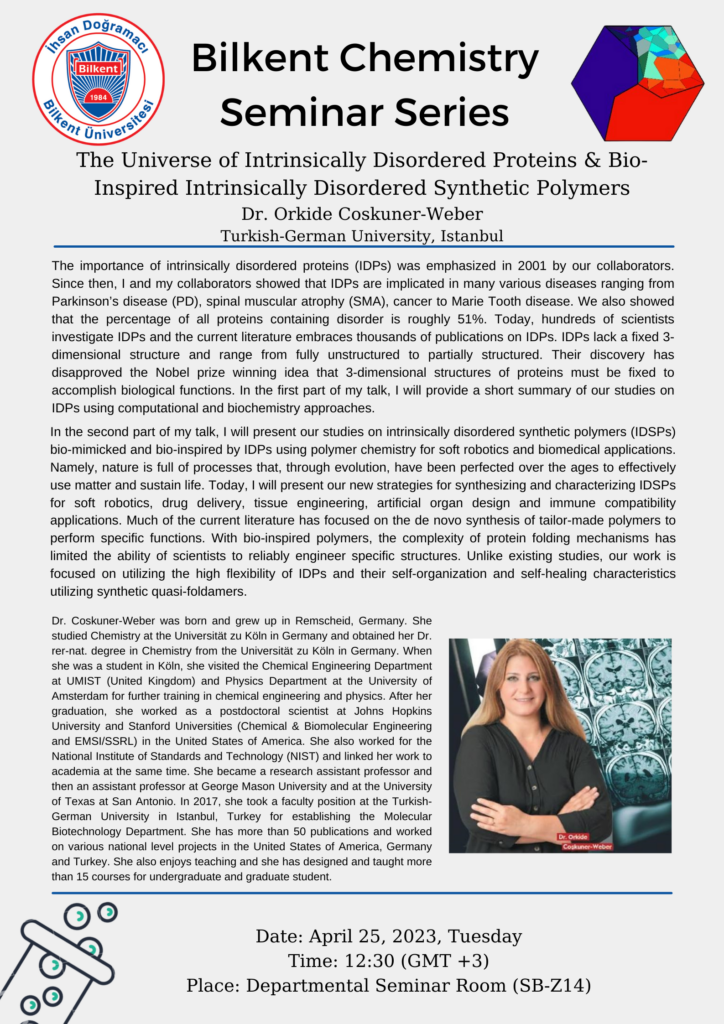Spring '23 Department Seminars with Dr. Orkide Coskuner-Weber
Title: The Universe of Intrinsically Disordered Proteins & Bio-Inspired Intrinsically Disordered Synthetic Polymers
Speaker: Dr. Orkide Coskuner-Weber, Associate Professor
Department of Molecular Biotechnology, Turkish-German University
Istanbul, Türkiye
Date: April 25, 2023, Tuesday
Time: 12:30
Place: Departmental Seminar Room (SB-Z14)

Abstract:
The importance of intrinsically disordered proteins (IDPs) was emphasized in 2001 by our collaborators. Since then, I and my collaborators showed that IDPs are implicated in many various diseases ranging from Parkinson’s disease (PD), spinal muscular atrophy (SMA), cancer to Marie Tooth disease. We also showed that the percentage of all proteins containing disorder is roughly 51%. Today, hundreds of scientists investigate IDPs and the current literature embraces thousands of publications on IDPs. IDPs lack a fixed 3-dimensional structure and range from fully unstructured to partially structured. Their discovery has disapproved the Nobel prize winning idea that 3-dimensional structures of proteins must be fixed to accomplish biological functions. In the first part of my talk, I will provide a short summary of our studies on IDPs using computational and biochemistry approaches.
In the second part of my talk, I will present our studies on intrinsically disordered synthetic polymers (IDSPs) bio-mimicked and bio-inspired by IDPs using polymer chemistry for soft robotics and biomedical applications. Namely, nature is full of processes that, through evolution, have been perfected over the ages to effectively use matter and sustain life. Today, I will present our new strategies for synthesizing and characterizing IDSPs for soft robotics, drug delivery, tissue engineering, artificial organ design and immune compatibility applications. Much of the current literature has focused on the de novo synthesis of tailor-made polymers to perform specific functions. With bio-inspired polymers, the complexity of protein folding mechanisms has limited the ability of scientists to reliably engineer specific structures. Unlike existing studies, our work is focused on utilizing the high flexibility of IDPs and their self-organization and self-healing characteristics utilizing synthetic quasi-foldamers.
Short Biography of the Speaker:
Dr. Coskuner-Weber was born and grew up in Remscheid, Germany. She studied Chemistry at the Universität zu Köln in Germany and obtained her Dr. rer-nat. degree in Chemistry from the Universität zu Köln in Germany. When she was a student in Köln, she visited the Chemical Engineering Department at UMIST (United Kingdom) and Physics Department at the University of Amsterdam for further training in chemical engineering and physics. After her graduation, she worked as a postdoctoral scientist at Johns Hopkins University and Stanford Universities (Chemical & Biomolecular Engineering and EMSI/SSRL) in the United States of America. She also worked for the National Institute of Standards and Technology (NIST) and linked her work to academia at the same time. She became a research assistant professor and then an assistant professor at George Mason University and at the University of Texas at San Antonio. In 2017, she took a faculty position at the Turkish-German University in Istanbul, Turkey for establishing the Molecular Biotechnology Department. She has more than 50 publications and worked on various national level projects in the United States of America, Germany and Turkey. She also enjoys teaching and she has designed and taught more than 15 courses for undergraduate and graduate student.